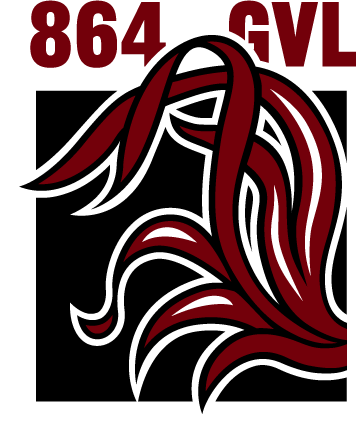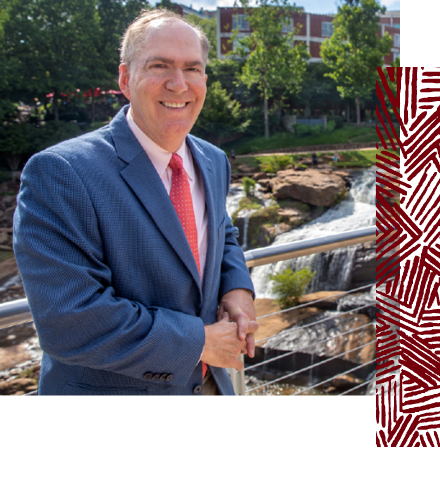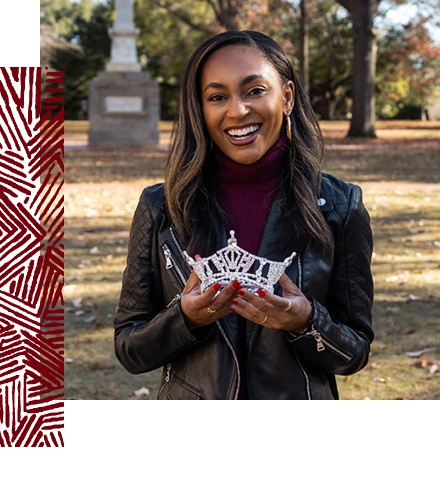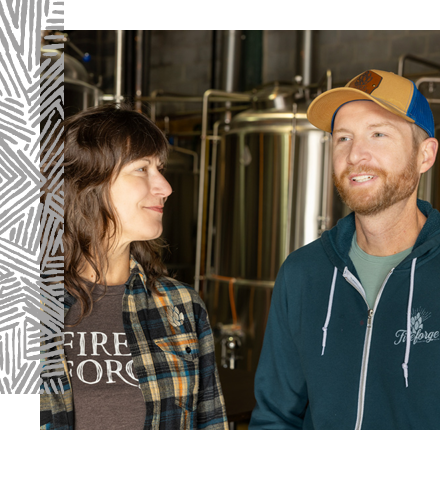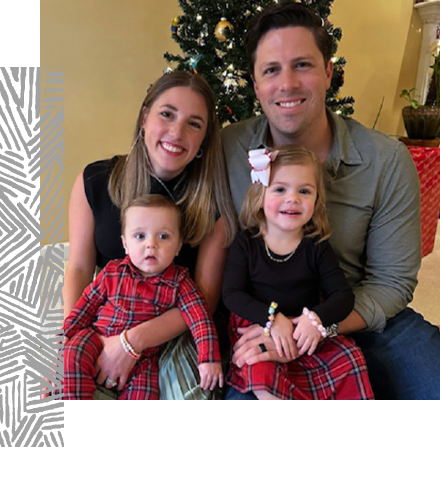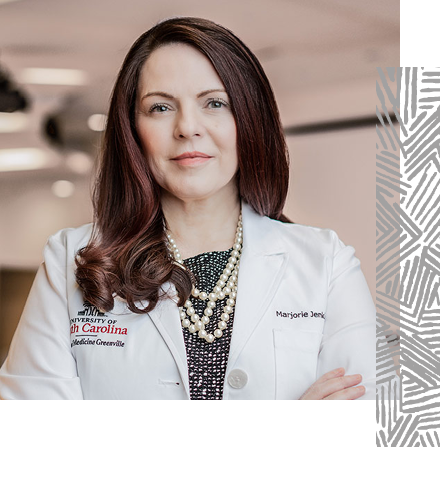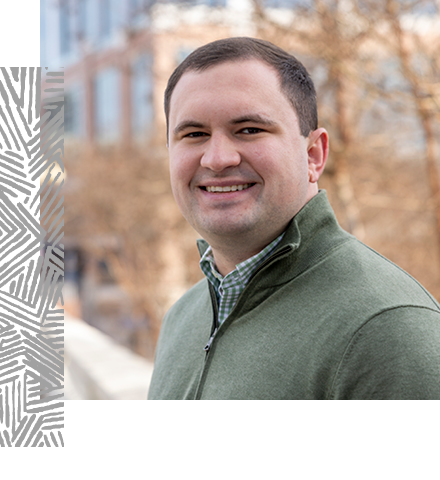video montage showing scenes from downtown greenville, sc
Gamecock Nation
Greenville
If you studied at the University of South Carolina and are now living and working in the Upstate, you might sometimes feel like you’re alone as a Gamecock. After all, there is another well known higher-ed institution 45 minutes down the road from downtown Greenville.
But the truth is that Gamecocks have a major presence in the Upstate. Miss South Carolina and Upstate native Jada Samuel is a USC alumna. Former Gamecock and Major League Baseball pitcher Michael Roth makes his home in Greenville. Longtime Greenville Mayor Knox White earned his law degree at USC, too.
And there are many more.
In fact, the Greenville area is home to more than 28,000 alumni of the University of South Carolina — making it the top destination for USC graduates after Columbia, South Carolina.
In early March, carloads of Gamecocks traveled to the Bon Secours Wellness Arena for the Southeastern Conference women’s basketball tournament, taking their infectious spirit to the streets and restaurants of Greenville. But they didn't just bring Gamecock Nation to the Upstate — they joined the thousands of Carolina fans who are already there.
Here’s a look at a few Gamecocks making an impact in the Upstate.
University of South Carolina law school alumnus Knox White has been mayor of Greenville since 1995 and served several years on city council before that. During his time in office, he has helped reinvent the Upstate city from the inside out.
Starting in the late 1990s, White helped guide downtown Greenville’s development with an initial emphasis on increasing residential development.
“Our real goal was to have people on Main Street after 5 and on weekends,” he says. “And today, mission accomplished. We’ve got [thousands of] people living downtown. Virtually all of the second floors on Main Street are residential, and that’s joined by high rises, condominiums, all that.”
A big part of that effort has been walkability, but it wasn’t as simple as putting in sidewalks and crosswalks. The bustling riverfront area that’s now home to Falls Park spent decades covered by a four-lane highway bridge — until the city mounted a controversial, but ultimately successful, multi-year campaign to replace the concrete and asphalt with green space.
“People who lived in Greenville all their lives had never seen the waterfall,” he says. “It was a very unusual political argument to say, ‘We’re going to spend $18 million to build a beautiful park around a waterfall you’ve never seen.’”

Of course, now that people have seen the falls — whether from the riverbank, the footbridge or Main Street itself — it’s difficult to remember a time when you couldn’t.
The latest project he has helped guide is Unity Park, where a partially abandoned and once segregated part of the city has been transformed into a 60-acre park just a quarter mile from downtown Greenville. Adjacent to the park will be nine acres of affordable and workforce housing, providing one of the largest footprints of such housing in the city of Greenville.
For White, being a part of projects like that and seeing them to fruition makes the job personally fulfilling.
“I like this job for a lot of reasons, but one reason is that there’s always something new, we’re always focused on what’s next,” he says. “Also, it’s a highly creative job, if you want it to be.”
But whether it’s encouraging outside investment in the city’s economy or bringing in tourists who enjoy the city’s vast cultural offerings and proximity to the mountains, White’s focus has remained firmly on the people who call Greenville home.
“My focus has always been people and quality of life. I’ve had a strong economic development focus, but also green space and trails, neighborhoods,” he says. “Livability is kind of the buzz word these days. I ran on that platform, and it resonated, even back in ’95.”
One afternoon last January, Jada Samuel’s phone started to blow up. Her friends wanted to know if she’d seen the news.
The Miss South Carolina Scholarship Organization had just announced that the Miss America competition’s maximum age for eligibility had been raised from 25 to 28.
It was especially big news for then-26-year-old Samuel, a Greenville native who competed in Miss South Carolina four times before aging out.
With her pageant career over, the 2018 University of South Carolina alumna was considering a move to Washington, D.C., where she could focus on her burgeoning political communications career. But now that she was eligible again, Samuel couldn’t pass up the chance to give Miss South Carolina one more shot.
“I always tell people, ‘Why not dream big?’” she says. “If you know something is bigger than you, and you know that your impact goes beyond your area or the local title that you’re serving, why not continue to serve? Why not continue to reach people with whatever message you have?”
Last June, that dream came true. Samuel was named Miss South Carolina, becoming the oldest woman to wear the crown in the pageant’s 86-year history.
Service is a key component of the Miss America program. Since winning at the state level, Samuel has focused on her social impact initiative, iShapeMe. The nonprofit mentoring organization promotes high self-esteem and positive body image for girls and young women. It was inspired by Samuel’s own childhood struggle with severe eczema, which caused bleeding, cracked skin and hair loss.
“I definitely had low self-esteem and lacked confidence in middle school and the beginning of high school,” she says. “My mentors — cousins and other women in my community — poured into me and made me feel more confident in the woman I was and what I brought to the table. I wanted to pour back into the girls in my community.”
On the wall in Brian and Nicole Cendrowski’s taproom hangs a sign from the homebrew club Upstate Brewtopians. It is a reminder of where they started before opening Fireforge Brewery & Taproom.
The two University of South Carolina grads had dreamed of owning their own brewery since making their first batch of beer in 2007. They debated whether to be a distributor or operate a taproom and where to locate. They settled on a taproom in Greenville, where they found a community they could be involved with and help grow.
They are now members of the Visit Greenville local tourism board and the South Carolina Brewers Guild. Nicole also has served on the board for the Conestee Nature Preserve, a 640-acre wildlife sanctuary just a few miles south of downtown Greenville.
One of their key goals when starting the taproom was to create that sense of neighborhood and community for their customers and their 25 full- and part-time employees.
“It’s bringing people together that really drew us to the industry,” says Brian, a 2003 MBA graduate. “We wanted our brewery to be focused on the community aspect of it. We wanted to brew beer, but also to have good food and live music and all the other things to create a fun and relaxing experience for customers.”
Brian, a 2003 MBA graduate is the brewer, but as with so many of their projects, Nicole, a 2002 English and Honors College graduate, provides the inspiration — including buying that home-brewing kit as a gift way back in 2007.
“We have a very complementary skillset,” Brian says. “I’m more of the technical, analytical; Nicole is much more the creative people person. So she handles a lot of the ‘people’ things and I handle more of the ‘thing’ things … she has a lot of that creative energy, then my job is to translate that into what’s going to be in a beer.”
As a Gamecock pitcher, Michael Roth helped lead South Carolina to three World Series title games, including back-to-back wins in 2010-11. Later, his talents took him to the Los Angeles Angels, where he made his Major League Baseball debut less than a year after his last out with the Gamecocks.
Today, the 34-year-old graduate of the Darla Moore School of Business is making pitches of a different sort — finding and closing real estate deals for himself and his clients at NAI Earle Furman in Greenville, where he lives with his wife, fellow USC graduate Rachel Sanna Roth, and their two children.
“We love it here,” says Roth, who graduated with degrees in marketing and international business and a minor in Spanish. “We have a great community. My family’s here. Rachel’s family is very close by. So it’s a great place for us to raise kids.”
Roth’s interest in real estate came during one of his stops in the minor league.
“As a starting pitcher, you only play one day out of five days, right? So when I was still playing in 2016, I was in Round Rock, Texas, and I would sit there in the dugout with this volunteer coach and talk to him about his business,” he says. “A lot of what he had invested in was commercial real estate deals, development deals in the Austin area. And I was like, ‘I need to figure this out.’
He made some connections, earned an internship with a broker and got his license.
“You have to have on-the-job training,” he says. “When I became an intern, that’s where you have to be there and you have to see deals being done. It’s just like getting reps in baseball.”
Now he works as a broker for NAI Earle Furman, helping developers and property owners make deals, but he also invests in his own properties.
“I like taking something old and creating something new,” he says.
It was almost a decade ago, but Elvia M. Pacheco says she still gets emotional when she thinks about taking her oath and becoming a U.S. citizen.
Now, working as the director of philanthropy with the United Way of Greenville County and founder of the nonprofit organization LatinosUnited, the USC Upstate graduate has come full circle — giving back to the community that helped mold her.
“During my naturalization process, I could only think about how fortunate and blessed I was to be a part of this country that played such a role in shaping the person that I am now,” Pacheco says. “During the ceremony I had a flashback of everything that I’d been exposed to alongside with my parents, this moment brought tears to my eyes as I remembered the sacrifices my parents made to provide me with a better future.”
As a Spanish and English speaker, Pacheco says she started translating and interpreting for her parents when she was 4 or 5 years old. Her parents also encouraged her to help family members and neighbors who had difficulty with the English language. It’s where she got her start volunteering and understanding the importance of helping the community — something she continues to this day.
When Marjorie Jenkins arrived as the dean of School of Medicine Greenville in 2019, she found a young medical school that is committed to educating and producing a new type of physician, offering a technologically advanced medical school environment, and addressing an ongoing shortage of doctors in a rapidly growing state.
She also found a city that was a great fit for her family. She and her husband quickly fell in love with Greenville, a city that boasts a thriving downtown with excellent dining and entertainment options, a minor league baseball park in the heart of the city, Falls Park, the Swamp Rabbit Trail and plenty of recreation and healthy living opportunities.
Jenkins also quickly realized what the medical school means for the Upstate — and for South Carolina’s aspiring physicians. She saw the School of Medicine Greenville as a place that would give an opportunity to students “who may have never heard, ‘You can be a physician; you can go to med school.’”
That was particularly important to Jenkins, who grew up in rural Appalachia where a high school guidance counselor told her she couldn’t be a doctor because her family was too poor. She ended up studying chemical engineering as a first-generation college student before attending medical school.
“Our medical school doesn’t rely just on numbers to admit someone,” Jenkins says.
“Yes, GPA matters, MCAT (the Medical College Admission Test) scores matter. But at
the end of the day, we want to create the best clinicians and we seek to have people
come into our medical school who are good communicators, who are dedicated to their
communities. We want our graduates to go back into the communities within South Carolina.”
Edward Anderson never thought his childhood dream of working in education would lead him out of the classroom — but it’s done just that. Now, he’s working to improve the education system as the executive director of OnTrack Greenville at United Way of Greenville County.
“As a principal, I was able to impact those 800 students and their families and those teachers, and in this role I’m able to impact the [entire] county,” says Anderson, who earned his bachelor’s degree in middle level education at the University of South Carolina in 2008. “Greenville County has 80,000 students — it’s the largest district in South Carolina. I get to impact systems that influence all those kids and directly target over 5,000 kids in concentrated areas of poverty.”
Anderson says, after 12 years working in Greenville County Schools, he began to feel constricted. During the pandemic, he began working in his current position where he gets to help principals, teachers, families and students in Greenville County get the resources, intervention and support they need to graduate and succeed after that.
In its first five years of implementation, OnTrack Greenville has successfully piloted a school-based health initiative in three middle schools, leading to more than 2,800 student visits with 97 percent of students returning to class after being seen. OnTrack Greenville has also distributed over 15,000 books and organized a summer program that has helped over 1,600 rising sixth-graders improve their reading and math proficiency in less than four weeks. It has also helped schools improve students’ English language arts and mathematics performance by about 25 percent.
“I really want to change the game for students and people in poverty. That has always been my goal,” he says. “It shouldn’t be by happenstance or by luck that someone is able to achieve success. It should be by intentional structures in place that really support someone’s mobility and their ability to move beyond their circumstances.”
Ross Lordo knew he wanted to be a doctor when he entered the University of South Carolina as a public health major. He just took a less traditional path to get there.
“My undergrad experience was focused much less on the stringent academics and more on becoming a very well-rounded individual, from developing leadership skills and the ability to balance a high workload,” says Lordo, who graduated in 2018. “I did what I needed to meet the academic threshold and requirements to get into medical school, but I was really focused on broadening my horizons and pushing myself.”
Student government was one way to achieve those goals. The Honors College student worked his way through the ranks, first as a member of Freshman Council and eventually as student body president. Beyond developing his leadership skills, he sought opportunities to get involved at USC, including the University Ambassador program, where he met his wife, Emily.
The Fort Mill, South Carolina, native knew he wanted to stay close to home, so he chose USC’s School of Medicine Greenville.
“It was important to me that I stayed true to who I was and the things that mattered most to me, which was being close to family, being in a place where I would be happy,” he says.
What he didn’t know was that he’d be drawn to OB-GYN. In fact, Lordo went into medical school certain that it was the only specialization he wouldn’t consider. That changed during his clinicals. OB-GYN physicians, he realized, are there for patients during the most significant moments of their lives. And seeing that he could help all patients, no matter their background, at a point when they are most vulnerable spoke to his interest in public health.
“Being a doctor who has a consistent standard amongst patients, whether they're English as a second language or don't speak any English at all or homeless or have a $2 million house — I think when others look at how you serve patients and see equity amongst all of them, then that really makes a difference.”
